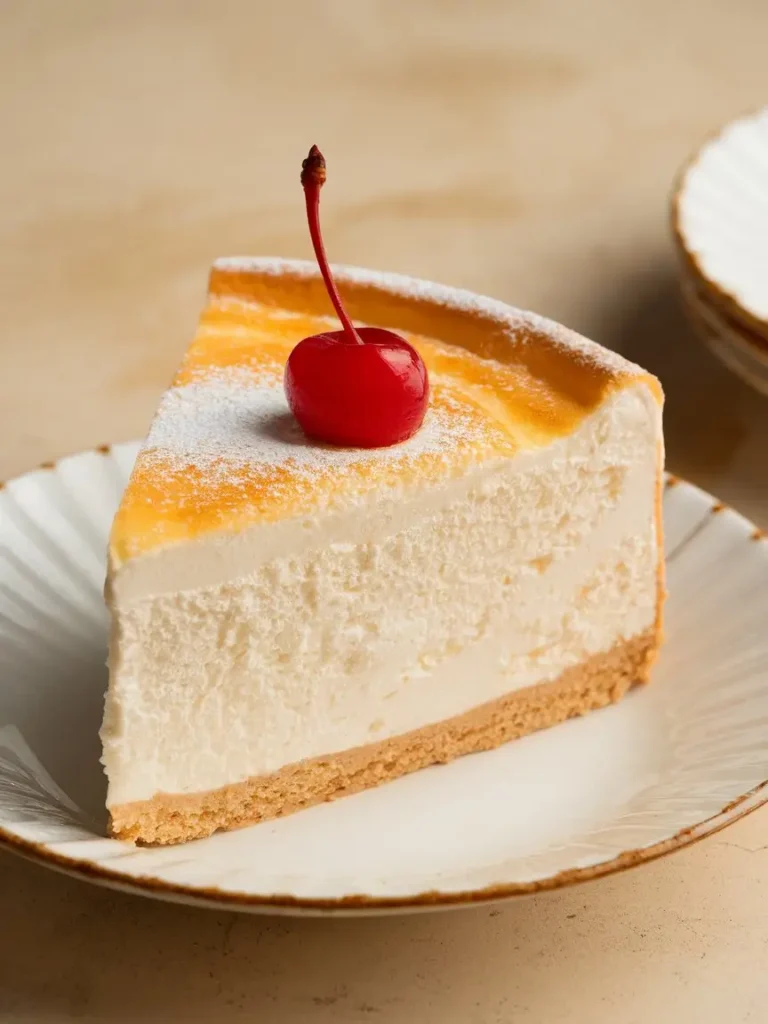Have You Ever Wondered Why Japanese Cotton Cheesecake Feels So Unbelievably Light?
Cheesecake is often considered the ultimate indulgence—a rich, dense treat that satisfies every sweet craving. But what if it could also be feather-light and cloud-like? Enter Japanese cotton cheesecake, a marvel that challenges everything you thought you knew about cheesecake texture. This recipe achieves an authentic, melt-in-your-mouth experience while incorporating subtle, balanced flavors.
A study by Rakuten Insight noted that over 60% of dessert lovers in Japan prefer fluffy textures in cakes, and Japanese cotton cheesecake is a prime example of this national trend. If you’re looking to master this culinary sensation or simply want to understand what makes it stand out from the traditional Western-style cheesecake, you’re about to learn the proven techniques and secrets behind its signature fluffiness and delicate flavor.
Ingredients List
Choosing the right ingredients is key to crafting an irresistible Japanese cotton cheesecake. Quality and freshness are non-negotiable, and a few smart substitutions can make this recipe friendly whether you’re dairy-free, gluten-sensitive, or simply experimenting with flavors.
- Cream Cheese (200g/7oz): Full-fat, for luxurious texture. Dairy-free alternative: cashew-based cream cheese.
- Whole Milk (100ml/3.4oz): Brings a creamy backbone. Oat milk works beautifully for a vegan version.
- Unsalted Butter (50g/1.7oz): Adds richness. Coconut oil gives a subtle tropical note.
- Eggs (5 large): Must be at room temperature for optimal volume.
- Granulated Sugar (100g/3.5oz): Controls both sweetness and structure. Coconut sugar yields a deeper, caramel tone.
- Cake Flour (60g/2.1oz): Sifted for supreme lightness. Gluten-free flour blends also work.
- Cornstarch (15g/0.5oz): A secret to stability and silkiness.
- Lemon Juice (1 tbsp): Just enough brightness to cut through richness.
- Vanilla Extract (1 tsp): Rounds out flavors with a warm aroma.
- Cream of Tartar (¼ tsp): Essential for stabilizing egg whites, but a pinch of salt can work if you don’t have it.
Just imagine how each of these ingredients transforms under gentle mixing and baking to create the signature jiggly, moist, and airy crumb.
Timing
One of the most remarkable aspects of Japanese cotton cheesecake is how efficiently it comes together compared to traditional cheesecake recipes that can consume your entire afternoon.
| Stage | Time Required | Notes |
|---|---|---|
| Ingredient Preparation | 15 min | Room temperature eggs and cream cheese are essential |
| Mixing and Assembly | 20 min | Accurate folding ensures the right texture |
| Baking | 60 min | Bain-marie method; 20% less baking time than dense styles |
| Cooling (in oven) | 30 min | Prevents sudden collapse |
| Total | 2 hours 5 min | Tastes best after an overnight chill |
In less than 2.5 hours (far less than classic cheesecake marathons), you’ll go from raw ingredients to a finished masterpiece that cuts cleanly but jiggles seductively.

Step-by-Step Instructions
1. Prepare Your Tools and Pan
Preheat your oven to 320°F (160°C). Line an 8-inch (20cm) round cake pan with parchment, then wrap the outside with aluminum foil to prevent water from seeping in during the water bath. Place the pan inside a larger roasting dish.
Pro Tip: A springform pan can work, but extra care is needed to seal potential leaks.
2. Gently Combine Dairy Ingredients
In a medium saucepan over low heat, combine cream cheese, butter, and milk. Stir until smooth, glossy, and fully melted. Remove from heat and let the mixture cool slightly.
Actionable Tip: Don’t rush this stage—overheating will break the emulsion and compromise the final cake’s texture.
3. Sift the Dry Ingredients
Sift cake flour and cornstarch together into a large bowl. This aerates the mixture, setting you up for that iconic fluffiness.
4. Unify Wet and Dry Components
Whisk the egg yolks into the just-warm dairy mixture. Pour this blend into the dry ingredients, mixing until just smooth. Whisk in the lemon juice and vanilla extract to enhance complexity.
5. Whip the Egg Whites
In a clean bowl, add egg whites and cream of tartar. Beat on medium speed until foamy. Gradually add sugar, a spoonful at a time, then increase to high speed until glossy soft peaks form.
Personalized Wisdom: Achieving perfect soft peaks is vital—overbeaten whites will crack your cake, while underbeaten ones make the result flat.
6. Fold for Supreme Lightness
Gently fold one-third of the meringue into the batter to lighten it, then carefully fold in the rest in two batches. Every bit of air you retain means more rise and jiggly texture.
7. Bake in a Water Bath
Pour the batter into your lined pan. Set the roasting dish on your oven’s middle rack and fill with hot water until it reaches halfway up the cake pan.
Bake for 60 minutes. The surface should appear dry, pale gold, and barely tremble when nudged.
8. Cooling
Turn off the oven and leave the cake inside (door ajar) for 30 minutes. This gentle cooling prevents cracks and keeps the cheesecake from deflating.
9. Unmold and Chill
Once out of the oven, run a knife around the edge to loosen. Invert the cake onto a plate, peel off parchment, and invert once more onto your serving dish. Refrigerate for at least 4 hours, or overnight for the cleanest slices.
Nutritional Information
A standard slice (1/8th of the cake) delivers a delightful dessert without overwhelming your daily intake. Here’s a quick look at the typical nutrition profile:
| Nutrition | Per Slice | % Daily Value (approx.) |
|---|---|---|
| Calories | 160 kcal | 8% |
| Protein | 4g | 8% |
| Fat | 10g | 15% |
| Saturated Fat | 6g | 30% |
| Sugar | 12g | 14% |
| Carbohydrates | 15g | 5% |
| Sodium | 95mg | 4% |
- Low glycemic index compared to traditional cheesecakes
- Naturally gluten-free if made with a suitable flour blend
- Moderate calories for a decadent dessert
Healthier Alternatives for the Recipe
It’s easy to personalize Japanese cotton cheesecake while keeping its delicate nature intact. Here are some alternatives that let you enjoy this dessert more often, with less guilt:
- Dairy-Free: Substitute cream cheese and milk with coconut or nut-based alternatives
- Lower Sugar: Use monk fruit or erythritol sweeteners for a lighter version
- Gluten-Free: Replace cake flour with almond flour or a rice flour blend
- High-Protein: Add a scoop of flavorless whey or soy protein isolate to the batter
- Lemon Zest: Swap lemon juice for zest to reduce acidity and add citrus aroma
Make it your own, knowing that flavor and texture can remain top-notch with careful ingredient swaps.
Serving Suggestions
Presentation transforms this cheesecake from a simple dessert to an enticing centerpiece.
- Classic: Dust with powdered sugar and pair with a cup of matcha green tea for authentic Japanese flair
- Berry Medley: Serve with a compote of mixed berries for vibrant contrast
- Chocolate Drizzle: Add a dark chocolate ganache or sauce for elegance
- Seasonal Fruit: Kiwi, mango, or peaches echo the cake’s airy spirit
- Celebratory: Top with edible flowers and delicate whipped cream for festive occasions
To keep the “cotton” structure front and center, cut with a hot, damp knife and wipe between slices for the cleanest look.
Common Mistakes to Avoid
Years of testing and feedback from baking communities reveal a few traps that can ruin the perfect Japanese cotton cheesecake. Here’s how to sidestep them:
- Overbeating Egg Whites: Creates a dry, cracked surface and deflating cake
- Underbaking: Results in a gummy, wet interior
- Skipping the Water Bath: Leads to uneven rise and a dense bite rather than an airy crumb
- Opening the Oven Door Too Early: Sudden temperature changes cause collapse
- Wrong Pan Lining: Unsealed or leaky pans let water in, ruining the base
A little patience pays off—the gentler your approach, the more rewarding the outcome.
Storing Tips for the Recipe
Japanese cotton cheesecake keeps surprisingly well if handled with care.
- Refrigerate: Store covered in the fridge for up to 4 days; flavors deepen over time
- Freeze: Slice, wrap pieces individually, and store up to 2 months for quick desserts
- Defrosting: Thaw overnight in the fridge to prevent texture loss
- Prepping Ahead: The batter can be made a few hours in advance and kept chilled; always bake fresh for best volume
For ultimate freshness, always protect with plastic wrap or an airtight container to prevent absorption of fridge odors.
Summary and Call-to-Action
Japanese cotton cheesecake delivers silky, cloud-like texture with gentle sweetness and soul-soothing flavors. Its straightforward process and adaptable ingredients make it possible to enjoy a lighter take on cheesecake any time. Ready to try this recipe at home? Share your creations in the comments, review your experience below, or subscribe for fresh dessert inspiration every week!
FAQs
What gives Japanese cotton cheesecake its unique texture? The combination of whipped meringue and gentle folding aerates the batter, while a bain-marie prevents cracking and dense spots.
Can I make this with fewer eggs? Eggs are crucial for lift and texture; reducing them leads to a flatter, less jiggly result.
Why do I need a water bath? It ensures even, gentle heat, keeping the cake soft and preventing surface cracks.
My cake deflated—what happened? Usually, this results from overbeaten meringue, sudden cooling, or not enough structure in the batter.
Can it be made vegan or gluten-free? Absolutely! Plant-based cream cheese, nut milk, and gluten-free flour can be swapped in with minor adjustments.
Feel free to leave more questions in the comments, or check out our related posts for foolproof souffle pancakes and decadent Basque cheesecakes!
Printable Recipe Card
Want just the essential recipe details without scrolling through the article? Get our printable recipe card with just the ingredients and instructions.


